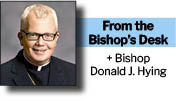
The Memorial of St. Vincent de Paul falls on September 27. Born in France in 1581, Vincent was ordained a priest in 1600 and committed his life to the formation of the clergy and the service of the poor.
To these ends, he founded two religious orders: The Congregation of the Mission (more commonly know as the Vincentians) and the Daughters of Charity to serve the sick and the needy.
An astute businessman, Vincent marshalled vast resources to fuel his works of charity.
He died in Paris in 1660.
Fast forward a few centuries to a debate at the Sorbonne University in Paris between an atheist and a zealous Catholic professor named Frederic Ozanam.
As he defended Catholicism, his adversary taunted, “What is your Church doing now? What is she doing for the poor of Paris? Show us your works and we will believe you!”
Stung by these remarks, Frederic founded the Society of St. Vincent de Paul with a group of young men in 1833.
Guided by Sr. Rosalie Rendu, a Daughter of Charity and renowned in Paris for her work with the poor, the Society dedicated itself to the holiness of its members and personal service to the needy and sick, especially victims of a particularly virulent outbreak of cholera.
Frederic lived in a turbulent age, the dawn of the Industrial Revolution, which saw thousands of people packing into the cities of Europe and America, living in horrible tenements and working essentially as slave labor in dirty, noisy, and dangerous factories.
This dehumanization of the working class led many thoughtful individuals, both within the Church and outside her, to serve the material needs of their suffering brothers and sisters, but also to seek reform of such oppressive structures.
Frederic sought to do the former through the Society and the latter through his philosophy and journalism.
The Society of Saint Vincent de Paul spread rapidly throughout the world.
Already in 1845, a Vincentian conference started in St. Louis, Mo.
Today, the Society is active in hundreds of countries, has almost a million members, and is the largest lay organization in the Catholic Church.
Organized in parish conferences, members pray together in regular meetings, visit those in need in their homes, assess the situation, and offer material help and fraternal charity.
This pastoral activity is not simply social work, but rather a living expression of Christian love, a compassionate solidarity, and a warm building of relationships.
The Society is also a national leader in providing emergency response to natural disasters.
Here in our diocese, Vincentian conferences are present and thriving in dozens of our parishes, as they serve the needs of our brothers and sisters.
They also operate many thrift stores, which provide low-cost goods to many people and help finance the bigger projects, such as the pharmacy and food bank in Madison.
The Society serves an increasing number of people who are forced to spend more of their money on housing and have little left for food, medicine, and emergencies.
Thousands of individuals and families in our diocese benefit greatly from the loving presence and ready charity of our generous Vincentians.
I am very proud of the good work and joyful holiness of the members of the Society of St. Vincent de Paul, and am profoundly grateful for their generosity.
Those who join are drawn by a deep desire to serve the poor, but often remain in the Society because they come to see their membership and work as their way of being Catholic and living out the Gospel in practical terms.
Rarely does a Vincentian ever leave!
This fact attests to the beauty of the mission and the work.
Recently, a Hispanic conference of the Society started in Madison to serve the needs of that community.
They are already a great blessing!
I encourage all of us to give generously to the Society of St. Vincent de Paul, to volunteer in their stores and for their projects, and to consider becoming a member yourself.
This beautiful way to live out the corporal and spiritual works of mercy is the legacy of the life and holiness of St. Vincent de Paul himself and the vision of Blessed Frederic Ozanam, who began this remarkable organization because of a taunt by an atheist long ago in Paris.
In Matthew Chapter 25, the Lord tells us that we will be judged in the end by how we treated those in need — the hungry, the sick, the stranger, and the imprisoned.
In this Scripture, we come to know that merely affirming faith in Jesus Christ is not enough. We must translate our belief into compassionate and sacrificial action on behalf of God’s children who suffer want and need.
In doing so, we are privileged to “touch Christ in His distressing disguise,” as St. Teresa of Calcutta would put it.
St. Vincent de Paul, pray for us!

